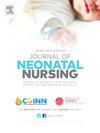Factors influencing nursing care competences in neonatal intensive care units: Generalized equation estimation analysis
Q2 Nursing
引用次数: 0
Abstract
Nurses’ care competence is an important determining factor for outcomes of sick infants hospitalized. This study investigated the individual and organizational factors influencing care competence of nurses in the neonatal intensive care unit (NICU).
A cross-sectional study surveyed 141 neonatal nurses from seven hospitals across South Korea. An online survey questionnaire consisted of care competence of neonatal nurses, the Korean version of the Practice Environment Scale of the Nursing Work Index, and demographic questions. A generalized equation estimation analysis identified individual and organizational factors predicting care competence of nurses from different hospitals.
NICU nurses who were older (p < 0.001), had higher education (p = 0.036), longer NICU working experience (p < 0.001), and advanced role position (p = 0.005) reported a higher competence level. Among work environments at the hospital-level, nurses’ care competence is different in three subdomains: nursing foundations for quality of care (p < 0.035), staffing and resource adequacy (p < 0.001), and collegial nurse–physician relations (p < 0.001).
NICU nurses’ competency can be improved with increased NICU working experience, better adequate staffing, and more positive relations with other care providers in the NICU.
影响新生儿重症监护室护理能力的因素:广义方程估计分析
护士护理能力是决定患儿住院治疗结果的重要因素。本研究旨在探讨影响新生儿重症监护病房(NICU)护士护理能力的个人及组织因素。一项横断面研究调查了韩国7家医院的141名新生儿护士。在线调查问卷包括新生儿护士护理能力、韩国版护理工作指数实践环境量表和人口学问题。通过广义方程估计分析,确定了影响不同医院护士护理能力的个体因素和组织因素。年龄较大的新生儿重症监护病房护士(p <;0.001)、高学历(p = 0.036)、较长的新生儿重症监护病房工作经验(p <;0.001),高级角色职位(p = 0.005)报告了更高的能力水平。在医院层面的工作环境中,护士的护理能力在三个子领域有所不同:护理质量的护理基础(p <;0.035),人员配备和资源充足性(p <;0.001),以及学院护士-医生关系(p <;0.001)。新生儿重症监护病房护士的能力可以通过增加新生儿重症监护病房工作经验,更好地配备足够的人员,以及与新生儿重症监护病房其他护理提供者建立更积极的关系来提高。
本文章由计算机程序翻译,如有差异,请以英文原文为准。
求助全文
约1分钟内获得全文
求助全文
来源期刊

Journal of Neonatal Nursing
Nursing-Pediatrics
CiteScore
2.00
自引率
0.00%
发文量
143
期刊介绍:
Aims & Scope: This is the practical, bimonthly, research-based journal for all professionals concerned with the care of neonates and their families, both in hospital and the community. It aims to support the development of the essential practice, management, education and health promotion skills required by these professionals. The JNN will provide a forum for the exchange of ideas and information between the range of professionals working in this field; promote cooperation between these professionals; facilitate partnership care with families; provide information and informed opinion; promote innovation and change in the care of neonates and their families; and provide an education resource for this important rapidly developing field.
 求助内容:
求助内容: 应助结果提醒方式:
应助结果提醒方式:


